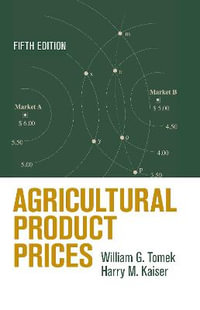`This timely book does a terrific job of providing a context for improving policies related to the harvest and trade of wild resources. What are the major issues, what works, what clearly doesn't work, and what are the best alternatives? There is a lot to absorb - and hopefully apply - here. The editors are to be congratulated for assembling such a thoughtful and informative collection of papers.' Charles M. Peters, Kate E. Tode Curator of Botany, The New York Botanical Garden
`It is high time to move from anecdotes and eclectic studies on NTFPs to democratic and sustainable plans that foster diverse livelihoods and new relationships to nature. In an exciting work of truly global scope - drawing on experiences from Mexico to India - Laird, McLain and Wynberg have done just that, assembling readable and cutting-edge proposals, which link grounded cases with general principles to fundamentally rethink the rules that govern forests around the world.' Paul Robbins, Professor and Head, School of Geography and Development, University of Arizona, USA
Products from the wild, also known as non-timber forest products (NTFPs), are used as medicines, foods, spices and for a multitude of other purposes. They contribute substantially to rural livelihoods, generate revenue for companies and governments, and have a range of impacts on biodiversity conservation. However, throughout the world NTFPs have been both overlooked and poorly regulated by governments. Inappropriate policies have not only led to overexploitation but have also generated new forms of inequity. This book reviews these experiences and aims to provide information to support new policy approaches towards NTFP regulation and the broader issues of governance associated with these products. The volume includes cases from around the world, a review of literature and resources, and an annotated bibliography linked to the People and Plants International website.
Industry Reviews
"I can think of no other group of resources that is so important, yet so poorly regulated, than wild products... This timely book does a terrific job of providing a context for improving policies related to the harvest and trade of wild resources. What are the major issues, what works, what clearly doesn't work, and what are the best alternatives? There is a lot to absorb - and hopefully apply - here. The editors are to be congratulated for assembling such a thoughtful and informative collection of papers." - Charles M. Peters, Ph.D., Kate E. Tode Curator of Botany, The New York Botanical Garden "It is high time to move from anecdotes and eclectic studies on NTFPs to democratic and sustainable plans that foster diverse livelihoods and new relationships to nature. In an exciting work of truly global scope -- drawing on experiences from Mexico to India -- Laird, McLain, and Wynberg have done just that, assembling readable and cutting-edge proposals, which link grounded cases with general principles to fundamentally rethink the rules that govern forests around the world. Researchers in human ecology, forestry, geography, rural sociology, and anthropology will find compelling findings and methods, while resource managers will find real world experiences and practical and implementable principles." - Paul Robbins, Professor and Head, School of Geography and Development, University of Arizona, USA "Before they became products with international markets, celebrity promoters, and an acronym, wild harvested species formed the basis of subsistence livelihoods for communities all over the world. For centuries, these resources were overlooked or ignored by the central governments of most of the countries in which they occur. And then, suddenly, in response to a variety of economic, political, and conservation pressures, it became clear to policymakers that it was time to finally 'do something' about wild products. Over the past few decades, these attempts at governance have produced a bewildering array of laws, tax structures, permit schemes, and policy frameworks that are, at best, confusing and marginally effective. I can think of no other group of resources that is so important, yet so poorly regulated. This timely book does a terrific job of providing a context for improving policies related to the harvest and trade of wild resources. What are the major issues, what works, what clearly doesn't work, and what are the best alternatives? There is a lot to absorb - and hopefully apply - here. The editors are to be congratulated for assembling such a thoughtful and informative collection of papers." - Charles M. Peters, Ph.D., Kate E. Tode Curator of Botany, The New York Botanical Garden
























